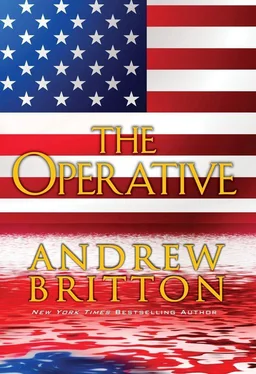Andrew Britton - The Operative
Здесь есть возможность читать онлайн «Andrew Britton - The Operative» весь текст электронной книги совершенно бесплатно (целиком полную версию без сокращений). В некоторых случаях можно слушать аудио, скачать через торрент в формате fb2 и присутствует краткое содержание. Жанр: Триллер, на английском языке. Описание произведения, (предисловие) а так же отзывы посетителей доступны на портале библиотеки ЛибКат.
- Название:The Operative
- Автор:
- Жанр:
- Год:неизвестен
- ISBN:нет данных
- Рейтинг книги:5 / 5. Голосов: 1
-
Избранное:Добавить в избранное
- Отзывы:
-
Ваша оценка:
- 100
- 1
- 2
- 3
- 4
- 5
The Operative: краткое содержание, описание и аннотация
Предлагаем к чтению аннотацию, описание, краткое содержание или предисловие (зависит от того, что написал сам автор книги «The Operative»). Если вы не нашли необходимую информацию о книге — напишите в комментариях, мы постараемся отыскать её.
The Operative — читать онлайн бесплатно полную книгу (весь текст) целиком
Ниже представлен текст книги, разбитый по страницам. Система сохранения места последней прочитанной страницы, позволяет с удобством читать онлайн бесплатно книгу «The Operative», без необходимости каждый раз заново искать на чём Вы остановились. Поставьте закладку, и сможете в любой момент перейти на страницу, на которой закончили чтение.
Интервал:
Закладка:
“Well, what do you expect?” Trask had said to him during a visit to White Sands with other private-sector captains of industry. “They’re the people who voted to let Reds in the organization.”
At the time, Gilbert was a liaison between the U.S. Army Command sergeant major Victor Houston and Commander Matt Lewis, deputy for navy of the White Sands Detachment, Naval Surface Warfare Center, Port Hueneme Division. When Gilbert replaced Houston in 1984, Trask became his go-to advisor on civilian matters. There was not a more passionate American than Trask. His company was privately held, and from Reconstruction to the present day the family business was about making the nation the greatest power, the greatest explorer, the greatest melting pot the globe had ever seen.
Gilbert trusted Trask. He had never known the industrialist’s honor and duty to be in conflict. Those qualities were not mutually bonded: a soldier could be asked to make an object lesson of a tribal leader by killing him in front of his people. For a civilian, the conflict could appear only in the form of treason. Nine times out of ten, traitors were motivated by money. That was not Jacob Trask.
But something else was true about Trask. He was a passionate man, especially about his country. He had ramped up the Trask Industries war machine in 2001 to provide ordnance for an attack against the Taliban and, later, for the invasion of Iraq. He did that without firm orders from the Department of Defense and, indeed, ended up producing nothing that could be used for traditional carpet bombing: he had filled the bombs with napalm that was left over from the Persian Gulf War. He did not share the concern of the Bush administration that civilians might be caught in the strategic waste laying of vast stretches of the tribal regions. The loss ran to tens of millions of dollars. He had told Gilbert that was the price of preparedness.
Gilbert had been impressed by that. Yet today, when they spoke on the way to the office, Trask said nothing about Baltimore. He had been awakened by alerts about New York; Trask hadn’t mentioned that, either. Gilbert’s sole concern was to take these men into custody.
Gilbert went directly to the interrogation room with the idea that if there was a problem, the problem was with one of the two men-probably both-who were being held in Conference Room B. The innocuous-sounding designation was known internally as the Bastille, since it was soundproofed, wired for video, had a teak door lined with iron mesh, no windows, and could be used to hold a person or persons indefinitely.
There was an antechamber with a gunmetal desk outside and three computer monitors on it. Two of them were for the cameras located in opposite corners of the square room. Gilbert saw that the men had been given bottled water and nothing more. Audio was streaming through an overhead speaker. The guests were silent. The door to the room was to the right, a guard stationed before it. A pair of naval intelligence officers were manning the computers. From there, they could access civilian and government databases. That information was displayed on the third monitor. Right now it was displaying the motor vehicle data and police records of each man.
There was one cell phone on the desk.
“Mr. Jenkins, only one of them had a phone?” Gilbert asked.
“On him, sir,” the intel officer replied.
“Nothing was recovered from the vehicle? The GPS?”
“Those weren’t part of the orders,” Jenkins replied. “Only the recovery of the men.”
“Brilliant,” Gilbert said.
“In defense of the team, there was a showdown of sorts with the Texas Highway Patrol. Lieutenant Delguercio thought it best not to let the situation escalate. Marley?”
“We’ve sent a team back to the vehicle and requisitioned whatever might have been recovered from the vehicle by local authorities,” the other officer said. “I’ll be monitoring that effort.”
“Who’s going to talk to these men?”
“Colonel Murray is on her way,” Jenkins said. “Command Sergeant Mintz thought it best to have an African American interrogator on this.”
As they spoke, the door to the antechamber opened. A young army officer strode in, saluted the brigadier general without stopping, and walked directly to the door of the Bastille. Jenkins buzzed her in.
“Efficient,” Gilbert said.
“You don’t know her, sir?”
“Only by dossier,” he replied.
It was going to be interesting, Gilbert thought. She would have seen the same data that was on the screen: these guys were clean.
Those were exactly the kind of men one would want to hire to hijack nuclear weapons.
Gilbert watched the monitors as Colonel Kathy Murray put her electronic tablet on the table, glanced at it, then regarded the men.
“Mr. Bell, Mr. Scroggins,” the woman said without preamble, “crates with nuclear materials, earmarked for delivery here by you, are missing. I want to know where they are. Mr. Bell?”
“Ma’am-”
“Colonel.”
He made a gesture of apology. “Colonel, I have no idea what you’re talking about. As I’ve been sayin’ to everyone who has had a hand in putting me here-”
“Thank you. Mr. Scroggins?”
The other man regarded her before answering. “I’d like to know who says there were nukes-”
“I’ll repeat the question if you like.”
“Colonel, we delivered electronic components,” Scroggins said.
“The address?”
“One was to the NYPD Counterterrorism office at 55 Broadway. The other was to an FBI lab at One West Street. Abbie handled the NYPD delivery, then went to get us lunch. I walked the other crates over to One West.”
She regarded Bell. “Earlier today you ignored an alert from your dispatcher.”
“It didn’t apply to us,” Bell said. “Because… we weren’t carrying nukes.”
“Did you make any stops?”
“A few rest areas for a few minutes and then at a lodge in Arkadelphia,” Bell said. “You can check the-”
“We know what to do. Name?”
“The Arklight Dome Lodge.”
“How did you disable the tracers?”
Bell shook his head. “We didn’t. There were no-”
“Mr. Scroggins?”
“What Abbie said,” he replied.
“What do you know about disabling a weapon-specific GPS device?”
Scroggins made a face. “I don’t know. You mean, like smashing it with a hammer?”
“What do you know about disabling a weapon-specific GPS device, Mr. Scroggins?”
“Shit, Colonel. I know shit about it.”
“We couldn’t even get to ’em if we wanted to,” Bell said.
Her dark eyes shifted to him. “Explain.”
“They told us in orientation that those gadgets get tied to the mechanism, inside. If the primary one isn’t working, the backup one goes on.”
“When the weapon is turned on,” she clarified.
“I don’t know about weapons, but for our gadgets, that’s my understanding,” Bell said.
Gilbert listened with detached interest. Col. Murray was going by the book: fast hits, no backtracking, keep them off balance and carried along by your agenda, not their own. But it wasn’t producing results. General Gilbert already knew that these systems had a backup. They gave you exactly one minute of warm-up before the weapon was fired. That was not a lot of time to prevent it from being used, because that was not the function of the timer. Someone on-site had to target and fire the weapon. The exact location was fluid because of external circumstances, like the repositioning of enemy security, patrols or, in the case of an airfield, the target itself. The idea was that a waiting chopper or vehicle could locate the signal, reposition itself, and get to the shooter in that minute, remove him from immediate-proximity danger. The air-to-ground nuclear rockets had an additional one-minute countdown detonator to give the team extra time before the shock wave or radioactive cloud hit. There was no need for a concussion explosion with a nuke: there was no way anyone at the target could shut it down or contain the blast.
Читать дальшеИнтервал:
Закладка:
Похожие книги на «The Operative»
Представляем Вашему вниманию похожие книги на «The Operative» списком для выбора. Мы отобрали схожую по названию и смыслу литературу в надежде предоставить читателям больше вариантов отыскать новые, интересные, ещё непрочитанные произведения.
Обсуждение, отзывы о книге «The Operative» и просто собственные мнения читателей. Оставьте ваши комментарии, напишите, что Вы думаете о произведении, его смысле или главных героях. Укажите что конкретно понравилось, а что нет, и почему Вы так считаете.












